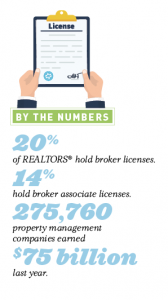Get an inside perspective on future career paths
By Michelle Huffman
Ask any REALTOR® about their career and you’ll hear 1.3 million different stories—one for each of today’s 1.3 million REALTORS®. No two career paths in real estate are the same.

That’s part of what makes real estate such an attractive field. It’s full of self-starters, entrepreneurs and ambitious go-getters who find success in dozens of different ways.
In thinking about how many different paths our CRS Designees have taken—and how valuable their insight is when they share it with others—the Council has developed unique career paths and a series of assessments that can help agents:
- Learn about occupations in real estate that are potentially a good match.
- Decide where they may need more training or experience.
- Identify the skills that will help them set themselves apart and succeed.
The assessment can also help you consider careers in real estate that you may not have thought about for yourself, like these different paths CRSs can pursue.
Broker/broker manager, broker/owner
The role: Agents run a real estate firm, usually in addition to their duties as a real estate agent. They are typically responsible for running the company, and recruiting and training agents.
Success story: It took a year-and-a-half of investigation, one rejected-and-revised business plan, and a lot of sound advice from his own broker for Mark Handlovitch, CRS, currently an associate broker with RE/MAX Real Estate Solutions in Pittsburgh, Pennsylvania, to launch his own firm.
Over the past decade, he built a team recognized as the No. 9 brokerage in the Pittsburgh area. Handlovitch and his wife were a solid team, and as a bookkeeper, she complemented his sales and training skills. He also hired an expert office manager—and the three of them combined to create a cohesive leadership team.
“As a broker, you have to be aware of your limitations, so you hire people who are good at your shortcomings,” he says.
Hiring the right agents allowed Handlovitch to avoid a role he dreaded: babysitter. He also referred out his leads to his agents to keep his workload in check and to make sure the agents knew he trusted them and wanted shared success.
He encourages every agent with interest in owning a brokerage to pursue it.
Pros:
- Brokers typically earn more than the average agent
- The freedom to work your way
Cons:
- Responsible for success of entire office
- Easy to wear too many hats
Consultant
The role: A consultant typically offers real estate perspectives or services, such as marketing properties to an outside business. The arrangement could require a consultant to take on an advisory role in addition to acting as a licensed agent.
Success story: Keith Furrow, CRS, Keith Furrow and Associates Realty in Gulf Breeze, Florida, has a unique background. His first job as an undercover detective for retailers taught him to pay close attention to what people were telling him between the lines of conversation, and through body language and subtle facial changes, he says.
This skill built his career because, as any good real estate agent knows, this profession is all about relationships—and this is even more true for consultants, whose positions aren’t going to show up as a job post on LinkedIn.
That’s been the case with Furrow, who has worked with dozens of builders as a real estate consultant. Many times he has helped assist builders who in the beginning “have no money, no floor plan and no land.” He helps them buy the land, reviews floor plans, does all the marketing—coordinating photographs, preparing materials, developing strategy—and takes the builder to the public, helping build the business.
Determining the right arrangement—which outlines responsibilities, financial expectations and terms that seem fair —can be challenging, especially when you’re first starting out.
“Over time, I have learned to say no when it’s appropriate and implement structured systems,” he says.
Pros:
- Job responsibilities and fees can be negotiated
- Agents can utilize a wide range of skills
Cons:
- No roadmap; a lot of learning from mistakes
- Work is typically inconsistent
Property manager
The role: Property managers are hired by owners or real estate investors, or they work for themselves, to manage the day-to-day operations of rental units, including maintenance, repairs and leasing. They also manage relationships with both owners and tenants.
Success story: Dee Davey, CRS, with Davey Goosmann Realty in Mansfield, Texas, was a successful agent when she opened her own firm in 2002, which eventually included a property management division. When she lost her property manager, she and her business partner intended to hire one, but Davey assumed the role. “I had no desire to be a property manager,” she says. “I thought it was the worst business in the world and a hectic way to make money.”
But Davey quickly discovered she actually liked the business. “As a real estate agent, you can sit down and lay out your goals and identify what your day is going to be like,” Davey says. “But in property management, someone walks in to lease a property or an owner calls and you have to snap into, ‘OK, what does this person need?’”
That means two things: Being organized—having documents together, solid contractors for maintenance, clear lists of contacts—and honing your communication skills. Ultimately, you work for the owner, but you often deal with the tenants. Clear communication and mutual respect are key.
“Tenants and owners are so appreciative of the way they’re treated, if they’re treated well,” Davey says. “And I don’t know it from any other angle.”
Pros:
- Lucrative for an organized, connected manager
- Opportunities available since investment in real estate properties has grown
Cons:
- Unpredictable 24/7 schedule
- Must wear many hats
Educator/trainer
The role: Educators teach and develop real estate skill classes for brokerages, associations or independent firms.
Success story: Donna Bruno, CRS, a regional sales instructor with Coldwell Banker in New York, learned at the beginning of her career that while an agent’s success starts with the agent, if she became successful, she would offer better mentorship and instruction than she received. She did find success and opened her own office, and added a second, all while raising her young kids.
Eventually, the demands of running a brokerage conflicted with the needs of her family. When her current position as an educator became available, she jumped at the opportunity to help agents in two states.
“It’s high-paced, high-energy, high-impact work,” she says. “I’m supporting 1,500 agents right now. I’m proud to say that I am part of a team that focuses on agent education at all phases of their careers. The fact that I have had their positions—as a new agent, top producer, manager and owner/broker prior to joining my team—is deeply appreciated by the agents and managers I support.”
A typical day includes in-person and live WebEx classes. After class, she answers about 100 emails or calls a day from her students.
“Obviously, you really need to be successful yourself. And if you’re going to come out of producing, you have to be willing to share the ideas that made you successful and give 100% of your heart to the agents you impact.”
Pros:
- Cash flow independent of seasonal real estate swings
- Opportunity to give back to the industry
Cons:
- Quick-turnaround travel
- Requires deep knowledge to answer questions
The quick assessments on crs.com/resources/career-path provide a custom analysis designed to help you grow professionally.








